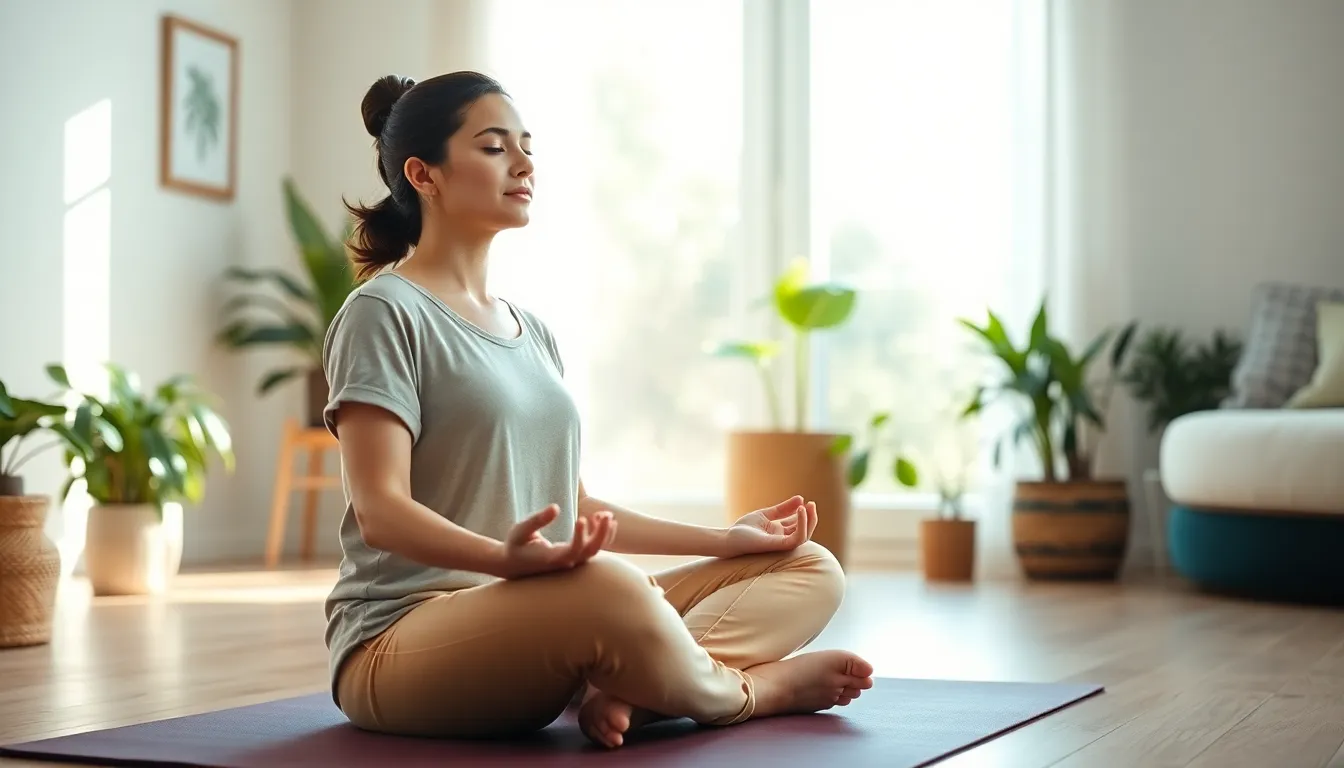In today’s fast-paced world, stress has become an unwelcome companion for many. The constant pressure from work, relationships, and daily responsibilities can leave individuals feeling overwhelmed and exhausted. However, the concept of stress-free living is gaining traction as more people seek balance and tranquility in their lives.
Embracing a stress-free lifestyle isn’t just about avoiding challenges; it’s about developing resilience and adopting habits that promote mental well-being. From mindfulness practices to simplifying daily routines, there are numerous strategies that can transform one’s approach to life. By prioritizing self-care and cultivating a positive mindset, anyone can pave the way toward a more serene existence.
Table of Contents
ToggleUnderstanding Stress-free Living
Stress-free living encompasses a lifestyle that prioritizes resilience and mental well-being. It involves adopting practices that minimize stressors and cultivate tranquility in everyday life.
The Concept of Stress-free Living
Stress-free living entails a conscious effort to simplify life and prioritize mental and emotional health. It requires individuals to identify stress triggers and actively make choices that promote relaxation and happiness. Key components include mindfulness practices, such as meditation and deep-breathing exercises, which help ground individuals in the present moment. Simplifying routines, setting realistic expectations, and nurturing supportive relationships also contribute significantly to achieving a stress-free lifestyle.
Benefits of Reducing Stress
Reducing stress offers numerous benefits, enhancing overall quality of life. These benefits include:
| Benefit | Description |
|---|---|
| Improved Mental Clarity | Lower stress levels lead to better focus and decision-making. |
| Enhanced Physical Health | Stress reduction strengthens the immune system and lowers blood pressure. |
| Better Sleep Quality | Less stress contributes to deeper and more restorative sleep. |
| Increased Resilience | Adaptability improves, enabling better handling of future challenges. |
| Stronger Relationships | Reduced stress fosters healthier communication and deeper connections. |
Embracing stress-free living promotes a balanced life, allowing individuals to enjoy daily experiences without the weight of excessive stress.
Techniques for Stress-free Living

Adopting specific techniques fosters a stress-free lifestyle. Practicing mindfulness and engaging in physical activity significantly contribute to mental and emotional well-being.
Mindfulness and Meditation
Mindfulness and meditation enhance awareness of the present moment, promoting relaxation. Techniques include focused breathing, body scans, and guided imagery. Research indicates that daily practice for just 10 to 20 minutes reduces anxiety and improves emotional regulation. Incorporating mindfulness into daily activities, such as eating or walking, reinforces the practice. Apps like Headspace and Calm offer structured sessions, making it accessible for beginners.
Physical Activity and Its Impact
Physical activity serves as a powerful stress reducer. Engaging in regular exercise releases endorphins, the body’s natural mood lifters. Activities such as running, swimming, or yoga benefit both physical health and mental clarity. The American Heart Association recommends at least 150 minutes of moderate aerobic exercise weekly. Group activities, like dance classes or team sports, facilitate social connections, further reducing stress. Prioritizing consistent movement creates a foundation for resilience and overall well-being.
Creating a Stress-free Environment
Establishing a stress-free environment is crucial for enhancing mental well-being. A tranquil space promotes relaxation and reduces anxiety.
Decluttering Your Space
Decluttering promotes a sense of control and peace. Removing unnecessary items creates an open and airy feeling. Setting aside time each week for organization can lead to significant improvements.
- Identify items that are no longer needed, such as old papers and unused furniture.
- Organize belongings by category to simplify the process.
- Donate or recycle items to minimize waste and support the community.
- Utilize storage solutions like bins and shelves to keep things tidy.
A well-organized space reduces distractions and fosters focus, making it easier to relax.
Importance of a Positive Atmosphere
A positive atmosphere elevates mood and enhances well-being. Key elements contribute to an uplifting environment.
- Incorporate natural light by opening curtains or adding mirrors to reflect sunlight.
- Use calming colors, such as blues and greens, to create a soothing vibe.
- Add plants or flowers, as they improve air quality and promote tranquility.
- Play soft background music or nature sounds to create a serene auditory experience.
Creating a positive atmosphere contributes significantly to stress reduction and overall happiness.
Building a Stress-free Lifestyle
Building a stress-free lifestyle involves strategic planning and conscious decisions that enhance overall well-being. Effective methods include time management strategies and balancing work with leisure.
Time Management Strategies
Time management strategies facilitate the organization of tasks, reducing feelings of overwhelm. Prioritizing daily activities through tools such as to-do lists enhances productivity and clarity. Implementing the Eisenhower Matrix allows individuals to distinguish between urgent and important tasks, streamlining focus on what truly matters. Allocating specific time blocks for work and breaks promotes a structured environment that minimizes stress. Setting realistic goals prevents burnout, giving individuals a sense of achievement without unnecessary pressure.
Balancing Work and Leisure
Balancing work and leisure enhances mental health and prevents stress overload. Establishing clear boundaries between professional and personal time supports a healthy work-life balance. Scheduling regular breaks during work hours, even for just five minutes, promotes mental rejuvenation. Engaging in hobbies or leisure activities revitalizes the mind and body, contributing to overall happiness. Prioritizing family time and social interactions fosters supportive relationships that can provide comfort and joy, further alleviating stress. Emphasizing the importance of relaxation leads to improved focus and increased satisfaction in both work and personal life.
Embracing stress-free living is essential for achieving a balanced and fulfilling life. By prioritizing mental and emotional health individuals can cultivate resilience and create a supportive environment. Simple practices like mindfulness and regular physical activity not only reduce stress but also enhance overall well-being.
Incorporating effective time management and nurturing relationships further promotes a serene lifestyle. As individuals make conscious choices to declutter their spaces and establish boundaries between work and leisure they pave the way for a more tranquil existence. Ultimately the journey toward stress-free living is achievable and rewarding, allowing individuals to savor each moment with clarity and joy.




